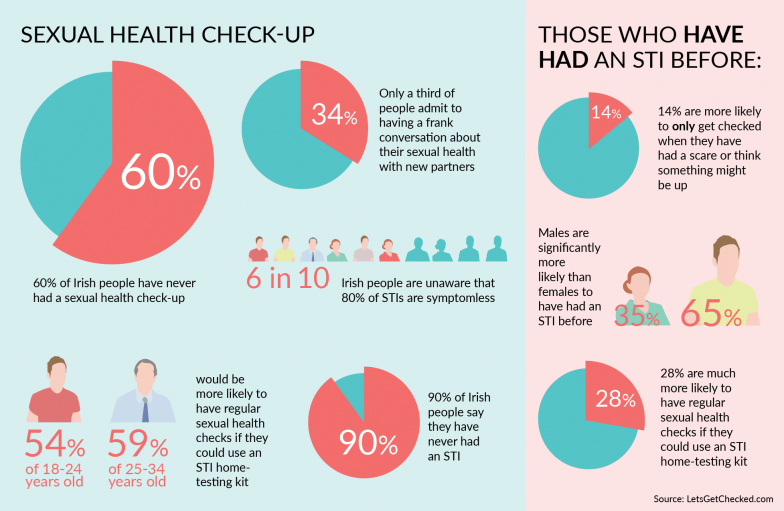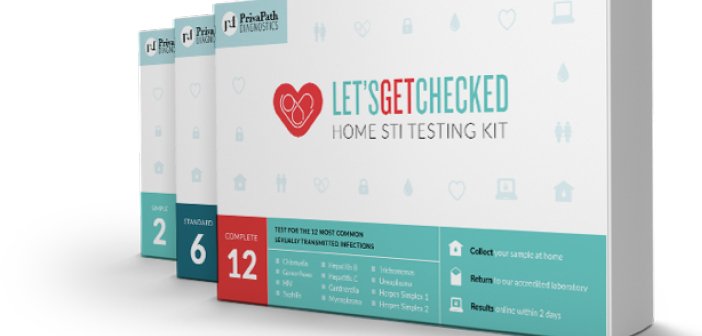The ‘Awkward Conversation’ about STIs doesn’t have to be so Awkward
It’s always nerve-wracking when you begin dating someone new, but it can become even more so when you have a sexually transmitted infection (STI).
Of course, STIs are incredibly common: there were 12,626 new cases of STIs in Ireland in 2014 alone (according to the most recent figures by the HPSC). But this number is just based on people who actually got tested, and according to research from LetsGetChecked, only 40% of Irish people have ever had a sexual health test. So the true figure is likely to be much higher.
Still, the stigma attached to STIs remain—which means people who have one often worry about when to tell the person they’re dating, how to bring it up, and whether it will end the potential relationship.
LetsGetChecked spoke to one woman who knows exactly what it feels like telling a new romantic partner about her infection. Her story shows that it doesn’t always have a huge impact on your relationship.
“I’ve actually never had someone reject me because of my infection”
Jenelle Marie Davis, founder of TheSTDProject.com, was in total shock when she first found out that she had Herpes. Especially as she was told it was an infection that she wouldn’t be able to get rid of.

“When I was first diagnosed, I was full of shame. I thought all the stigmas about STIs were true and that I would never be able to date again or find anyone who would want me because I believed I was damaged goods,” she told LetsGetChecked. “Of course, that’s all wildly inaccurate and the opposite of my actual dating experiences, but at the time, I thought it was all true, and I was mortified.”
As Jenelle began dating again, she realised that everything she believed about her STI, and people who had STIs, were false. “I’ve actually never had someone reject me because of my infection, even though that’s not true for everyone”, she said. Some responded with ‘You mean that’s it? That’s all you had to tell me?'[pullquote]According to research from LetsGetChecked, only 40% of Irish people have ever had a sexual health test.[/pullquote]
“Over time, I realised that the things society wants you to believe about yourself after you contract an STI, and what is true about yourself regardless of your STI, are two very different things. With a combination of time, positive personal experiences, and education, I realised that I was not defined by my infection and it did not reduce my value or desirability at all.”
Genital Herpes is neither as common nor quite as dangerous as many people believe. For many who are infected, it is often described as an occasional inconvenient skin rash or blisters (which can be quite painful). Yet Herpes is one of the most feared and stigmatised infections out there.
Ever notice how friends or co-workers will complain that they are getting a cold sore, but no one ever announces when they are suffering from a genital herpes outbreak? There is a stigma attached to genital herpes, while cold sores (oral herpes) is the subject of casual conversation.
Only one-third of Irish people have ‘the conversation’ with new partners
Regardless of your STI status, having a conversation about sexual health testing with new partners should be an important part of your sex life. Many couples say that they use condoms regardless of their partner’s history, and that’s how they avoid the awkwardness of this discussion. However, if you’re interested in developing a relationship with increased intimacy over time, it’s a good idea to discuss STIs at some point.

With only a third of Irish people admitting to having a frank conversation about their sexual health with new partners, it appears that a stigma remains in Ireland around discussing sexual health and getting tested.
The two most common STIs in Ireland, Chlamydia and Gonorrhoea, are both bacterial infections which can usually be cured easily with a round of antibiotics. The earlier they are discovered, the easier they are to treat. If left untreated, however, it can lead to long term health issues such as infertility. This is why it is important to have ‘the conversation’ before engaging in sex without a condom.
Starting ‘the conversation’
The conversation doesn’t have to be about trust issues, or a discussion of past relationships and promiscuity or prudence, but more a look at the future and caring for yourselves enough to protect each other. Try some of these lines to get the conversation started:
- “I usually like to get tested every time I start a new relationship. Will you get tested with me?”
- “Did you know that most STIs are symptomless? You can carry an infection on from previous relationships without even realising it.”
- “Getting tested is easy. There are home testing kits you can order online, so you can take the test alone. No clinic or GP appointment required.”

Remember – an STI is just the same as any other infection. You’ll still be the same person. You’ll still have happy, healthy relationships. You’ll still have great sex. Open communication, trust, loyalty – these are the types of things that great sex and relationships are built upon. That will not change with a conversation about STIs.
Visit www.letsgetchecked.com to learn more about sexually transmitted infections or to order a home STI test.
